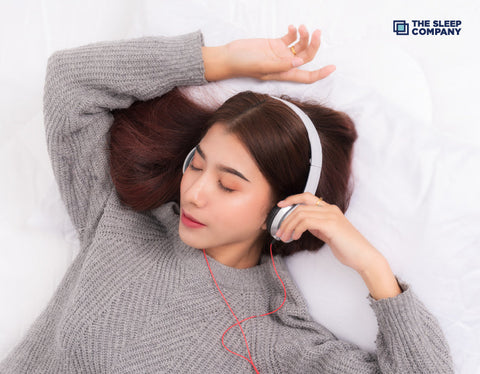My Cart

Student Life and Sleep Management Tips


We spend maximum time in the student phase, which begins almost as soon as we reach age 5. However, due to increased competition and career-oriented parents, the age of schooling has been reduced to 3. Though at that age, students are not given much of a study but instead trained to get used to school life, for three years old, it is indeed a burden. Sometimes, a lot.
Albeit the pressure given by schools, kids also are pressured by parents, relatives, and society to learn beforehand and get a head start in the rat race of life. All this pressure only keeps increasing as they grow old, and they are required to spend a maximum amount of the day in school learning new things and back at home revising them. Another added pressure on students’ heads is extra classes for studies and extracurricular activities.
All in all, students are fully packed throughout the day and shoulder the pressure of education and competition so much that it starts affecting their sleep.
Sleep, which is essential for the overall growth of the person, along with food, and exercise, becomes the easy prey of this rising pressure in students’ lives and, if not taken care of, can create a significant health crisis for them.
Importance of sleep management for students

A night of adequate sleep is crucial for everyone, especially students. Students fall under the age group of 5 to 20, which are also the years of growth and learning.
Students need to learn lots of things such as languages, mathematics, history, and science. It also includes physical activities like sports, exercises, and extracurricular activities, such as dancing and arts. As well as, they just aren’t supposed to learn but need to compete against other students, appear in exams, earn the best grades and be able to select their dream career.
When students get those peaceful and quality hours spent sleeping in the comfort of the mattress, it helps them improve many things, such as their immune system, memory, concentration, mental, emotional, and physical strength, and academic performance.
How much sleep do students require?
Every age group needs different amounts of sleep, including naps and night sleep.
- 3 to 5 years or preschoolers require 10 to 13 hours, including naps
- 6 to 12 years or school-age require 9 to 12 hours
- 13 to 18 years, teenagers or high-schoolers need 8 to 10 hours
- And 18 to 22 years, young adults or college students require 8 to 9 hours
Tips for managing sleep hours

Though it is easy for pre-schoolers or school students to get enough sleep along with studies and other activities, it becomes difficult as they grow due to increased hours of school, extra classes, study, and other activities. Therefore it becomes essential to manage the sleep hours and create a proper routine to squeeze everything in those 24 hours without missing anything and ruining health.
Here are some dos and don’ts of sleep management for students.
Do’s
Sleep schedule
It is very important amongst everything else. Regular sleep and wake time will help students segregate their 24 hours properly and give adequate time to everything such as school, class, homework, projects, extra activities, and free time to relax. They also should follow the sleep-wake timetable on weekends and holidays to remain habitual.
Exercise
Exercise is beneficial for health, strength, and overall growth. It also helps your body get exhausted enough to increase the release of sleep-inducing hormones such as melatonin and serotonin in the bloodstream. That will help you fall asleep when you hit the mattress rather than keep you tossing and turning all night.
Bedtime routine
Many students fail to fall asleep immediately when they lay on the mattress. Therefore, having a bedtime routine helps them associate these things with sleep. Also, the body sends signals to the brain and visa-versa to fall asleep as soon as they begin their bedtime routine.
For bedtime routines, students can include reading, listening to music, or meditating for at least 1 hour before bed.
Daylight exposure
Our body has an internal biological clock called the circadian rhythm. It works according to natural daylight. Therefore, exposure to natural bright light during the day prompts the circadian rhythm to work appropriately and corrects the body’s natural sleep and wake clock.
Therefore, exposure to natural light during the day helps decrease the level of cortisol hormones, and as the day turns into night, the sleep-inducing hormone melatonin level increases.
Eating habits
Eating healthy and nutritious food is vital to maintaining mental and physical health and improving sleep quality. Also, a proper diet schedule is essential for enhancing kids’ growth.
There are many food items such as poultry products, vegetables, dairy products, and fruits that have sleep-inducing nutrients such as calcium, vitamins, melatonin, magnesium, and proteins.
Create an ideal bedroom environment
Just like eating, exercising, and routine, it is essential to have an ideal bedroom environment, which includes
- Temperature
Our body temperature lowers down as we drift deeper into sleep at night. Therefore having an adequate room temperature according to body temperature is vital. Make sure that the room is cooler compared to the extreme temperature.
For that, you can use a fan and aircon and keep windows open for proper ventilation. Also, you can use the Sleep Company’s mattresses with SnowTec Cooling fabric and SmartGRID technology with 2500 air channels that do not absorb body heat and prevent night sweats, providing sound sleep.
- Mattress
Many people prefer to sleep on the hard floor, but it may cause joint and back pain in the future. And students at a tender age have a delicate physique which is more prone to get affected. Therefore, a mattress is essential to provide comfort and support to our bodies when we sleep.
You can use a mattress according to your preference for comfort or support. There are many top mattress brands in India that manufacture mattresses specifically for kids and teenagers. Also, you can select the Sleep Company’s Smart Luxe Mattress, which are a perfect combination of comfort and support.
- Darkness
Darkness is essential for good sleep quality. It is because our biological clock or circadian rhythm works according to exposure to daylight. Therefore, when it becomes dark, the cortisol level, which keeps us sharp, declines, and the melatonin hormones, which boost sleep, increase. Therefore, make sure you turn off the lights before falling asleep. Also, use dark curtains to prevent any outside lights from entering the room.
Don’ts
Just like some do’s, here are some things that students must avoid to achieve a good quality of sleep.
Avoid blue light exposure.
Blue light exposure is one of the worst enemies of sleep. Blue light emitted from screens such as laptops, mobile, and televisions harm your brain cells and expose you to sleep deprivation.
Therefore, ensure you avoid screen time at least 30 to 60 minutes before bed.
Avoid caffeine
Many students consume caffeine in order to remain awake and fresh to complete their studies. However, caffeine works as an energizer, further affecting sleep quality in the long term.
Therefore, make sure that you avoid the consumption of caffeine after the evening and late at night.
Avoid daytime naps
As kids grow older, they require less sleep time, an average of 8 to 9 hours. And it becomes important to get that sleep at night to improve health. Many of the students tend to take naps during the day due to various reasons. But Day time naps can create problems for night sleep and may keep you awake for long hours. It further creates problems in daily activities.
Therefore, avoid daytime naps as much as possible. And if you feel too exhausted, then keep your naps to a minimum and not in the late evening.
Avoid studying in bed.
Our brain has a tendency to memorize and associate things with each other. Therefore, using a bed or mattress where you sleep for other activities may confuse your brain.
To avoid confusion and ensure that your brain sends signals to your body to fall asleep when you lay down on the mattress, use it only for sleeping.
Avoid having heavy meals before bed.
Eating junk food or a heavy meal requires enough time for digestion. And if you eat a heavy meal just before bedtime can hamper your metabolism and digestion system, which further can impact your sleep.
Therefore, make sure you eat a light meal for at least two hours before hitting bed.
Bottom Line:
Studying is crucial to becoming successful in the future. However, sleep is also vital for overall growth and to make students understand what they learn. Sleep management helps students to manage their day appropriately without hampering their sleep, health, and career.



































































